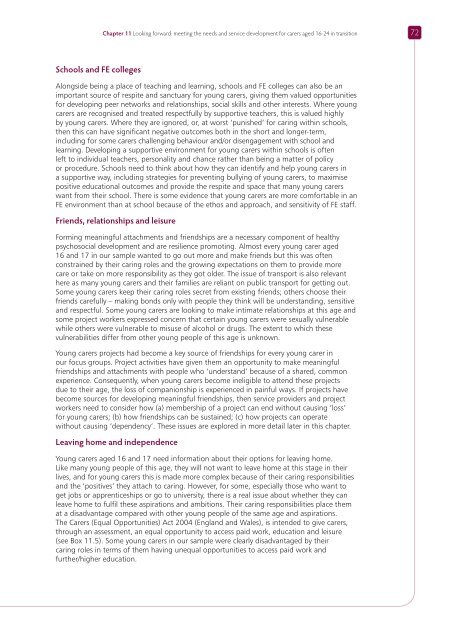Young Adult Carers in the UK - The Princess Royal Trust for Carers
Young Adult Carers in the UK - The Princess Royal Trust for Carers
Young Adult Carers in the UK - The Princess Royal Trust for Carers
You also want an ePaper? Increase the reach of your titles
YUMPU automatically turns print PDFs into web optimized ePapers that Google loves.
Schools and FE colleges<br />
Chapter 11 Look<strong>in</strong>g <strong>for</strong>ward: meet<strong>in</strong>g <strong>the</strong> needs and service development <strong>for</strong> carers aged 16-24 <strong>in</strong> transition<br />
Alongside be<strong>in</strong>g a place of teach<strong>in</strong>g and learn<strong>in</strong>g, schools and FE colleges can also be an<br />
important source of respite and sanctuary <strong>for</strong> young carers, giv<strong>in</strong>g <strong>the</strong>m valued opportunities<br />
<strong>for</strong> develop<strong>in</strong>g peer networks and relationships, social skills and o<strong>the</strong>r <strong>in</strong>terests. Where young<br />
carers are recognised and treated respectfully by supportive teachers, this is valued highly<br />
by young carers. Where <strong>the</strong>y are ignored, or, at worst ‘punished’ <strong>for</strong> car<strong>in</strong>g with<strong>in</strong> schools,<br />
<strong>the</strong>n this can have significant negative outcomes both <strong>in</strong> <strong>the</strong> short and longer-term,<br />
<strong>in</strong>clud<strong>in</strong>g <strong>for</strong> some carers challeng<strong>in</strong>g behaviour and/or disengagement with school and<br />
learn<strong>in</strong>g. Develop<strong>in</strong>g a supportive environment <strong>for</strong> young carers with<strong>in</strong> schools is often<br />
left to <strong>in</strong>dividual teachers, personality and chance ra<strong>the</strong>r than be<strong>in</strong>g a matter of policy<br />
or procedure. Schools need to th<strong>in</strong>k about how <strong>the</strong>y can identify and help young carers <strong>in</strong><br />
a supportive way, <strong>in</strong>clud<strong>in</strong>g strategies <strong>for</strong> prevent<strong>in</strong>g bully<strong>in</strong>g of young carers, to maximise<br />
positive educational outcomes and provide <strong>the</strong> respite and space that many young carers<br />
want from <strong>the</strong>ir school. <strong>The</strong>re is some evidence that young carers are more com<strong>for</strong>table <strong>in</strong> an<br />
FE environment than at school because of <strong>the</strong> ethos and approach, and sensitivity of FE staff.<br />
Friends, relationships and leisure<br />
Form<strong>in</strong>g mean<strong>in</strong>gful attachments and friendships are a necessary component of healthy<br />
psychosocial development and are resilience promot<strong>in</strong>g. Almost every young carer aged<br />
16 and 17 <strong>in</strong> our sample wanted to go out more and make friends but this was often<br />
constra<strong>in</strong>ed by <strong>the</strong>ir car<strong>in</strong>g roles and <strong>the</strong> grow<strong>in</strong>g expectations on <strong>the</strong>m to provide more<br />
care or take on more responsibility as <strong>the</strong>y got older. <strong>The</strong> issue of transport is also relevant<br />
here as many young carers and <strong>the</strong>ir families are reliant on public transport <strong>for</strong> gett<strong>in</strong>g out.<br />
Some young carers keep <strong>the</strong>ir car<strong>in</strong>g roles secret from exist<strong>in</strong>g friends; o<strong>the</strong>rs choose <strong>the</strong>ir<br />
friends carefully – mak<strong>in</strong>g bonds only with people <strong>the</strong>y th<strong>in</strong>k will be understand<strong>in</strong>g, sensitive<br />
and respectful. Some young carers are look<strong>in</strong>g to make <strong>in</strong>timate relationships at this age and<br />
some project workers expressed concern that certa<strong>in</strong> young carers were sexually vulnerable<br />
while o<strong>the</strong>rs were vulnerable to misuse of alcohol or drugs. <strong>The</strong> extent to which <strong>the</strong>se<br />
vulnerabilities differ from o<strong>the</strong>r young people of this age is unknown.<br />
<strong>Young</strong> carers projects had become a key source of friendships <strong>for</strong> every young carer <strong>in</strong><br />
our focus groups. Project activities have given <strong>the</strong>m an opportunity to make mean<strong>in</strong>gful<br />
friendships and attachments with people who ‘understand’ because of a shared, common<br />
experience. Consequently, when young carers become <strong>in</strong>eligible to attend <strong>the</strong>se projects<br />
due to <strong>the</strong>ir age, <strong>the</strong> loss of companionship is experienced <strong>in</strong> pa<strong>in</strong>ful ways. If projects have<br />
become sources <strong>for</strong> develop<strong>in</strong>g mean<strong>in</strong>gful friendships, <strong>the</strong>n service providers and project<br />
workers need to consider how (a) membership of a project can end without caus<strong>in</strong>g ‘loss’<br />
<strong>for</strong> young carers; (b) how friendships can be susta<strong>in</strong>ed; (c) how projects can operate<br />
without caus<strong>in</strong>g ‘dependency’. <strong>The</strong>se issues are explored <strong>in</strong> more detail later <strong>in</strong> this chapter.<br />
Leav<strong>in</strong>g home and <strong>in</strong>dependence<br />
<strong>Young</strong> carers aged 16 and 17 need <strong>in</strong><strong>for</strong>mation about <strong>the</strong>ir options <strong>for</strong> leav<strong>in</strong>g home.<br />
Like many young people of this age, <strong>the</strong>y will not want to leave home at this stage <strong>in</strong> <strong>the</strong>ir<br />
lives, and <strong>for</strong> young carers this is made more complex because of <strong>the</strong>ir car<strong>in</strong>g responsibilities<br />
and <strong>the</strong> ‘positives’ <strong>the</strong>y attach to car<strong>in</strong>g. However, <strong>for</strong> some, especially those who want to<br />
get jobs or apprenticeships or go to university, <strong>the</strong>re is a real issue about whe<strong>the</strong>r <strong>the</strong>y can<br />
leave home to fulfil <strong>the</strong>se aspirations and ambitions. <strong>The</strong>ir car<strong>in</strong>g responsibilities place <strong>the</strong>m<br />
at a disadvantage compared with o<strong>the</strong>r young people of <strong>the</strong> same age and aspirations.<br />
<strong>The</strong> <strong>Carers</strong> (Equal Opportunities) Act 2004 (England and Wales), is <strong>in</strong>tended to give carers,<br />
through an assessment, an equal opportunity to access paid work, education and leisure<br />
(see Box 11.5). Some young carers <strong>in</strong> our sample were clearly disadvantaged by <strong>the</strong>ir<br />
car<strong>in</strong>g roles <strong>in</strong> terms of <strong>the</strong>m hav<strong>in</strong>g unequal opportunities to access paid work and<br />
fur<strong>the</strong>r/higher education.<br />
72


